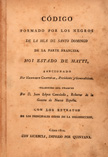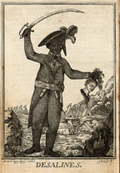Early struggles for independence in Latin America grew out of the Napoleonic wars raging in Europe. Francisco de Miranda, who had participated in the American Revolution and the French Revolution, sought to incite a war for independence in Latin America in 1806, with the tacit assistance of Great Britain. His assault on Venezuela met with resistance loyal to the Spanish Crown. At the same time, British forces under William Beresford invaded Rio de la Plata. Driven out by local militias, with little direct assistance from Spain, the confrontation is often seen as one of the earliest stirrings of an independence movement in Latin America. |
||
| [35] Miranda's Ill-Fated Expedition
Sherman, John H. A general account of Miranda's expedition. Including the trial and execution of ten of his officers. And an account of the imprisonment and sufferings of the remainder of his officers and men who were taken prisoners. New York: McFarlane and Long, 1808. Francisco de Miranda fought in the U.S. war for independence, on the side of the Spanish in the Battle of Pensacola; traveled widely in Europe, where he imbibed the ideas of the Enlightenment; took part in the French Revolution, though he ultimately believed it had lost direction and gave support to the monarchists. Finding refuge from an arrest warrant, Miranda settled in Britain, where he formulated plans for the independence of Spanish America. With unofficial British help, Miranda traveled to New York in 1805 for men and equipment. From there, he and a small force recruited in New York sailed first for Haiti, where they added two ships and some additional men. On 3 August 1806, Miranda’s force landed in La Vela de Coro, Venezuela, and took over the fort there. Local residents failed to rally to the cause of independence, and Miranda and his men were forced to retreat. A total of 57 of his men were captured on the expedition, and ten were executed. |
||
[36, 37, & 38] The British in La Plata Officer of the expedition. An authentic narrative of the proceedings of the expedition under the command of Brigadier-Gen. Craufurd, until its arrival at Monte Video... London: 1808 [i.e., 1807]. |
||
| Whitelocke, John, 1757-1833. Authentic and complete trial of Lieut. Gen. Whitelocke, late commander of the attack on Buenos Ayres; by a court-martial, assembled in the Great Hall, Chelsea College, from Thursday, January 28, to Tuesday, March 15, 1808; including a complete copy of his defence.... London: Day , [1808]. | ||
Whitelocke, John, 1757-1833. The proceedings of a general court martial, held at Chelsea Hospital, on Thursday, January 28, 1808, and continued, by adjournment, till Tuesday, March 15, for the trial of Lieut. Gen. Whitelocke, late commander-in-chief of the forces in South America... . London: Day , [1808]. In 1806 and 1807 the British launched a series of assaults against Buenos Aires and Monte Video. The 1806 occupation was successfully repelled by Santiago de Liniers after local merchants argued that opening the ports to free trade would damage their monopoly trade with Spain. The second assault was led by Lt. General John Whitelocke. He and his commander Robert Crauford met strong resistance from local militias, and were forced to surrender. For this disgrace, he was court-martialed and forced to resign from the service. |
||
[39 & 40] The Specter of the Haitian Revolution Código formado por los negros de la isla de Santo Domingo de la parte francesa hoi estado de Hayti, sancionado por Henrique Cristoval, presidente y generalisimo. … Cadiz: Quintana, 1810. Dubroca, 1757-ca. 1835. Vida de J.J. Dessalines, gefe de los negros de Santo Domingo; con notas muy circunstanciadas sobre el origen, caracter y atrocidades de los principales gefes de los negros desde el principio de la insurreccion en 1791. … Mexico: M. de Zúñiga y Ontiveros, 1806. |
||
| Miranda’s incursion to the north, and the British to the south, bred concern among both creole and peninsular Spaniards about the dangers of revolutions, particularly those in multi-ethnic societies. Spaniards in Spanish America were vastly outnumbered by the indigenous, mestizos, and Africans, and the specter of the Haitian Revolution still haunted them. |














